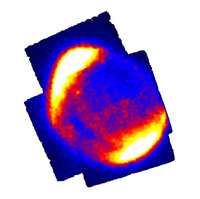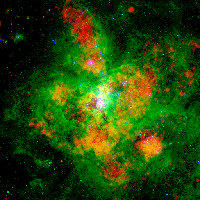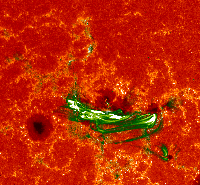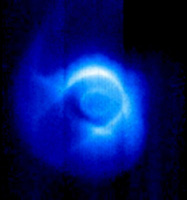
Ask Us
Space Physics:
Black Holes
What is a Black Hole?
What exactly is a black hole?Actually, the topic of your question is well covered by our sister learning center, Imagine the Universe!.
Dr. Eric Christian
Where Does the Matter Go Inside a Black Hole?
I read somewhere that after time and matter were sucked into the center of the black hole, they became a part of the singularity amd ceased to exist as we know space and time. Is it possible that time/light/matter is then "stored" in the center of the black hole?There's a good page on black holes, including the singularity, at Imagine the Universe! Your question is answered there.
Beth Barbier
Life in a Black Hole?
Are there any life forms in black holes? Why?No signs of any life have been detected in black holes, or anywhere else other than Earth.
If people were trapped in a black hole, could they live?
Dead. Torn into individual atoms by gravity before they even reach the black hole.
Is there any connection between the Bermuda Triangle and black holes?
No black hole at the Bermuda Triangle. In fact, no Bermuda Triangle. The number of "disappearances" in that region is consistent with any other well-traveled region.
Dr. Eric Christian
Black Hole at the Center of the Galaxy?
I have heard that black holes have been found in the centers of other spiral galaxies besides our own. Does the Milky Way have one?Probably. You can read more about this at our sister site Imagine the Universe!
Beth Barbier
Black Hole and the Solar System
Would the solar system, if still remaining after the Sun goes supernova, be eventually pulled spiralling into the black hole that's in the center of the Milky Way?You've got two common misperceptions here. A black hole doesn't have any more gravitational attraction than the star or whatever that formed it. If the Sun instantaneously turned into a black hole, the Earth and all the other planets would orbit just the same with no change in gravity. Because black holes are much more concentrated, however, you can get closer to them than you could to the Sun and get to a region where the force of gravity is much higher. But at the distance of the Earth there is no difference.
The other common misperception is that the Sun is going to go supernova. Only the largest of stars can go supernova. Our Sun is much too small. It will eventually expand to a red giant, and then contract down to a white dwarf.
Dr. Eric Christian
Black Holes and the Speed of Light
From what I understand, if something could travel at the speed of light, it's mass would reach an enormous size, and it would appear to be nothing (since as things approach the speed of light they become thiner and thiner until they appear to be nothing). This is similar to the description of a black hole, something with an enormous mass that we are unable to see. Is there any connection between these? That is, black holes could be objects or planets that have reached the speed of light. This would explain their huge mass and the fact that we cannot see them.They are not really related. If an object is moving at close to the speed of light, it will appear to have a very high density (more mass and thinner), but it will not be a black hole. It will appear normal to something moving along at the same speed. A black hole has enough rest mass (mass in the reference frame where it is at rest) that light cannot escape it.
Two different things.
Dr. Eric Christian
Black Hole Event Horizon
If the center of the event horizon sphere surrounding a black hole is a point of zero dimension, and the velocity of light is absolutely constant, the sphere should be absolutely perfect. If a photon originates on a radius of the event horizon sphere, half way out to the "surface" of the sphere, would it not (with its head start) be able to travel beyond the surface of the sphere? Would it continue on out only to be drawn back toward center from further out? If that happened, it would have established a single point on another and bigger event horizon sphere. If a huge number of photons were being created at all distances from center, might not the event horizon of the black hole be a very fuzzy thing?The event horizon of a black hole is not "fuzzy". A photon that starts an infinitesmal distance inside the event horizon never makes it past the horizon. It does not get a little further before it is dragged back. This is because space is warped, and you can't think about it the way you normally think about gravity.
Dr. Eric Christian
Antimatter Inside a Black Hole
Suppose I was beyond the event horizon where no information could be sent "back", but I had some antimatter and used a little bit to destroy the matter inside the event horizon. Although the energy would not be detected, would the loss in the gravity of the black hole be detected?General relativity says that energy and mass are essentially different forms of the same thing. Combining matter and antimatter destroys mass by converting it into energy, usually photons (light). Since the energy won't escape the black hole, its gravity won't change. Energy causes gravity too, although it is negligible under most circumstances.
Dr. Eric Christian If antimatter was tossed into a black hole, would the strength of the gravitational field be lessened or inverted? Would light/energy still possess the same strength of gravity? Would entropy occur inside a black hole? If so, would this cause an expansion in spacetime around the black hole?
There is less difference between antimatter and matter than you think. Although the electric charge and a few other factors are opposite for antimatter and matter, and even though a particle and its antiparticle will annihilate (turning into photons), when it comes to gravity, there is no difference. So antimatter falling into a black hole will increase the mass of the black hole, no different than matter falling in.
Dr. Eric Christian
(July 2002)How Do Gravitons Escape from a Black Hole?
If gravitons are quanta of the gravitational field, and mediate the gravitational force, how do gravitons escape from black holes? I understand that regions of strong gravitational fields can cause production of particles (in much the same way as strong E-fields can cause electron-positron pair production). Is this the mechanism by which gravitons are mediated? That is, they are not exchanged between the actual masses doing the gravitating, but by the space which they distort? Thank you for your inquiry. Your question is one of the questions asked most frequently at relativity courses in graduate school.A black hole is a region of space-time which curves back in upon itself - presumably because of the collapse of a massive star to a size below the Schwarzschild radius. Photons or other particles don't escape from "inside" a black hole, because the extreme curvature doesn't allow any "escape trajectories". Imagine particles moving along the inner surface of a ball, and trying to get outside the ball - they never could. (A black hole is not spherical like a ball however.)
To better answer your question, let me first move away from gravitons, which we do not understand very well, to photons, which are better understood. It is known that black holes can have charge, and therefore a static electric field. The question is, how does this field escape the horizon? In that, I should remind you that the horizon is the surface through which one cannot send any signals. Now, signals (i.e. photons) involve time changing fields. Indeed no such signal can come out of the horizon. However, the electrostatic field of a charge does not convey any signal; it can therefore escape from the black hole. In technical parlance it is a space-like object, and those can cut across horizons. Or differently, in the language of excitations of the electromagnetic field (the photons)- there are transverse and longitudinal photons. The transverse ones are those we see, and travel at the speed of light. The longitudinal ones are those which "are there" in space, they do not convey any signal and are the static fields of the charges.
Now at some level of approximation one could substitute gravitons for photons. the ones that correspond to the longitudinal part are those providing the static Newtonian (far away) fields of black holes (and all other objects). The ones producing gravitational radiation require "shaking" the gravitational lines of force and those come from outside the horizon.
Drs. Louis Barbier and Demos Kazanas
Black Hole to Another Dimension?
Is it true that black holes are a gate to another dimension?There is no scientific evidence that black holes lead to another dimension. Even if they did, you would be torn into your component atoms by tidal forces long before you actually got through the black hole. It does make for interesting science fiction stories, however.
Dr. Eric Christian
Black Hole Out of Space/Time?
What happens when you're not in space/time? Or, more precisely, if you go through a black hole is there a separate dimension on the other side? If there is, you continue to exist. If there isn't, you cease to exist. Though NASA can't necessarily send an intelligence probe through a black hole (too much radiation, too far away, no funding, and probably no response from the probe) what would happen if you rotate something 360 + 1/infinity degrees? Since a black hole is an infinite curve it's probably the same thing.We don't know exactly what would happen if you weren't in space/time, since we have no observations of any place that is outside of space/time. If you traveled into a black hole, the tidal forces would tear you into component atoms before you got to the Schwarzschild radius. After that, your mass would be added to the singularity, and that's it. There is no evidence that you would come out somewhere else (no signs of white holes, for example). Rotating something by 360 + 1/infinity degrees just gets you immeasurably little past 360 degrees, it does nothing special.
Dr. Eric Christian Back to "Ask Us" directory






Questions and comments to: cosmicopia@cosmicra.gsfc.nasa.gov
Curator: Dr Eric R. Christian, NASA
Responsible NASA Official: Dr Eric R. Christian
Privacy Policy and Important Notices

HOME
In the News
History
Ask Us
Great Links
Glossary
Site Map
Search NASA